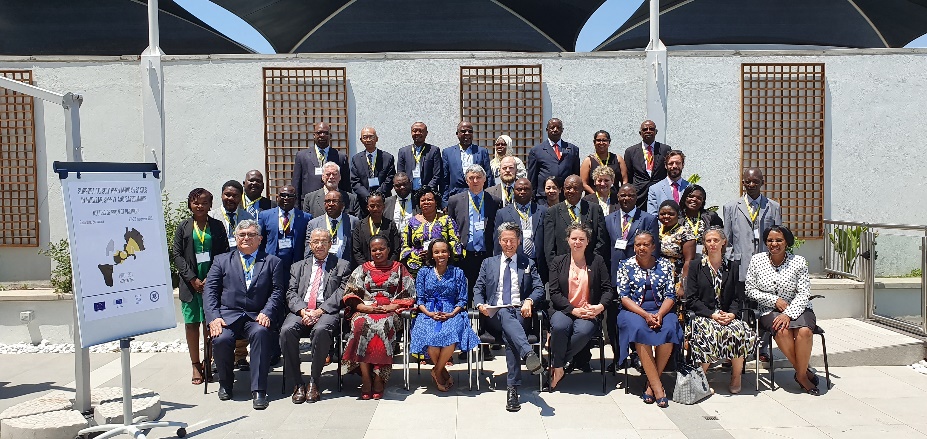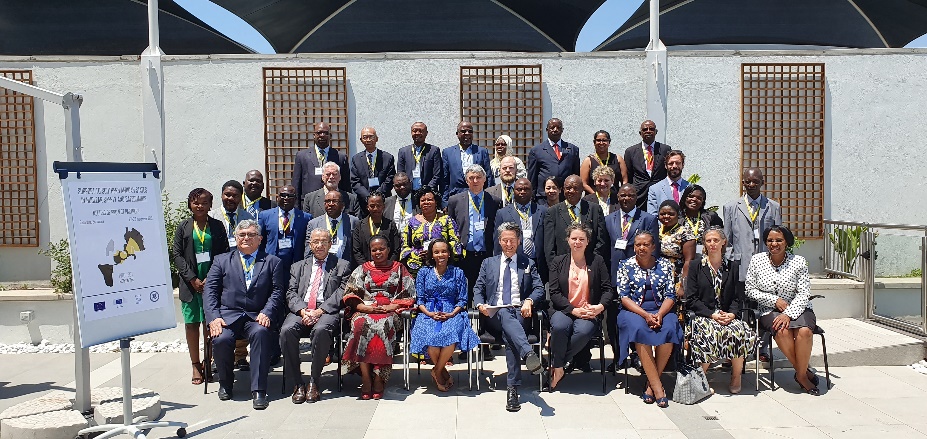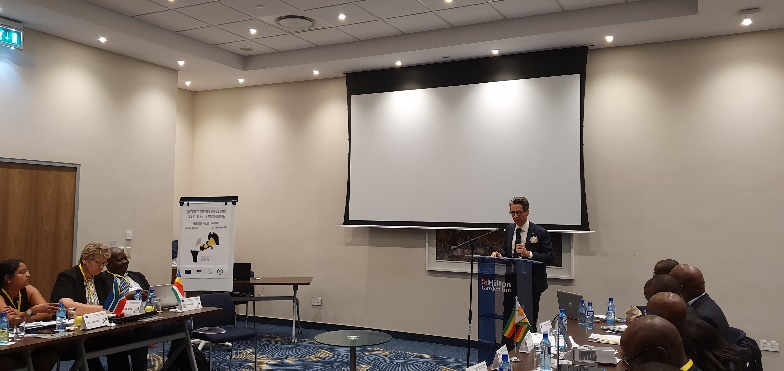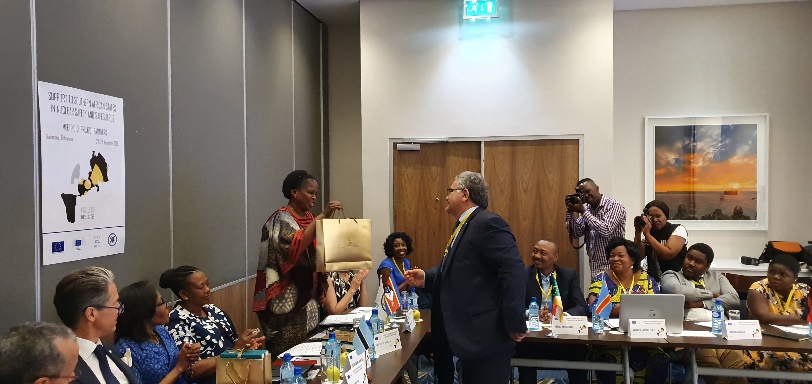Botswana, SADC Secretariat join the Group of Partners engaged with the Implementation of the Project Support to Southern African states in Nuclear Safety and Safeguards

 27 November 2019, Gaborone. For the first time since the start of project MC 5.10/15 B Support to Southern African states in Nuclear Safety and Safeguards, a joint meeting of the project participating countries and of SADC’s Nuclear Regulators Network was attended by representatives of SADC Secretariat and the government of Botswana. Convened by ISTC in Gaborone, just a few days after the decision for an extension of the duration of the project, the meeting took stock of its achievements and allowed deliberations about regional collaboration in harmonising national legislations and strengthening the capacity of specialised authorities responsible for radiation protection, transportation of radioactive materials and building a nuclear safety, security and safeguard architecture.
27 November 2019, Gaborone. For the first time since the start of project MC 5.10/15 B Support to Southern African states in Nuclear Safety and Safeguards, a joint meeting of the project participating countries and of SADC’s Nuclear Regulators Network was attended by representatives of SADC Secretariat and the government of Botswana. Convened by ISTC in Gaborone, just a few days after the decision for an extension of the duration of the project, the meeting took stock of its achievements and allowed deliberations about regional collaboration in harmonising national legislations and strengthening the capacity of specialised authorities responsible for radiation protection, transportation of radioactive materials and building a nuclear safety, security and safeguard architecture.
 The project partners were greeted by ambassador Jan Sadek, Head of the EU Delegation to Botswana and to SADC, who praised the meeting as another illustration of the partnership between the European Union and the Southern African Development Community that covers many areas of mutual interest, including nuclear safety and security. He emphasized that the event is consonant with the objectives of the EU-SADC Economic Partnership (EPA), as it touches on the security/development nexus. The EU feels important that Europe should offer its best practices to its African partners. For instance, the European Regulatory Cooperation Forum brings together European countries with advanced nuclear energy sector, as well as with smaller and with nascent nuclear power programs. This is an example that SADC countries may wish to follow as Southern Africa faces the same need of a platform that unite diverse countries with various levels of use of radioactive materials.
The project partners were greeted by ambassador Jan Sadek, Head of the EU Delegation to Botswana and to SADC, who praised the meeting as another illustration of the partnership between the European Union and the Southern African Development Community that covers many areas of mutual interest, including nuclear safety and security. He emphasized that the event is consonant with the objectives of the EU-SADC Economic Partnership (EPA), as it touches on the security/development nexus. The EU feels important that Europe should offer its best practices to its African partners. For instance, the European Regulatory Cooperation Forum brings together European countries with advanced nuclear energy sector, as well as with smaller and with nascent nuclear power programs. This is an example that SADC countries may wish to follow as Southern Africa faces the same need of a platform that unite diverse countries with various levels of use of radioactive materials.
 Speaking of behalf of the Executive Secretary of SADC, Ms. Mapolao Rosemary Mokoena, Director for Infrastructure, SADC Secretariat, acknowledged that the member states are at different levels of developing their national strategies for the peaceful use of nuclear power and applications. She highlighted two specific objectives of project MC 5.01/15 B that are of great importance for the SADC region: harmonization of legal frameworks and training and capacity building of people and institutions. While at the regional level, there is no specific cooperation programme, the Secretariat is ready to collaborate with all members states, regional forums and international organizations. As a cross-cutting subject, enhancing nuclear energy and security will entail the involvement of all relevant directorates of the SADC Secretariat.
Speaking of behalf of the Executive Secretary of SADC, Ms. Mapolao Rosemary Mokoena, Director for Infrastructure, SADC Secretariat, acknowledged that the member states are at different levels of developing their national strategies for the peaceful use of nuclear power and applications. She highlighted two specific objectives of project MC 5.01/15 B that are of great importance for the SADC region: harmonization of legal frameworks and training and capacity building of people and institutions. While at the regional level, there is no specific cooperation programme, the Secretariat is ready to collaborate with all members states, regional forums and international organizations. As a cross-cutting subject, enhancing nuclear energy and security will entail the involvement of all relevant directorates of the SADC Secretariat.
Ms. Dimpho Mogami, Secretary for Justice, Ministry of Defence, Justice and Security, Botswana, acknowledged the importance of the peaceful use of Uranium for the betterment of the SADC region. She singled out the achievements of project MC 5.01/15 B with a focus on its outreach to more partners and to the younger generation. The Secretary informed that Botswana is fine tuning its national institutional and legal frameworks in tackling radiation protection, prudent management and compliance with international nuclear safeguards obligations.
Dr. Messaoud Baaliouamer, the Executive Secretary of AFCONE, reminded the European Union-African Union joint commitment to promote sustainable development, peace, security, democracy, prosperity, solidarity and human dignity. He made an overview of AFCONE’s activities to encourage better collaboration among the various African organizations and forums in the field of nuclear and called for appropriate coordination of all regional networks. He noted that while AFCONE is reaching out to more European and international partner, underlining in this context the Memorandum of Cooperation between AFCONE and ISTC , concluded in August 2019, and the joint Plan of Action that is currently elaborated in line with the objectives of project MC 5.01/15 B.
The project participating countries – Malawi, Tanzania and Zambia –presented latest developments in their nuclear and radiation protection legislations and regulations and shared their views on achieving higher levels of nuclear safety and security through regional cooperation. Prof. Jo-Ansie van Wyk, a political scientist from the University of South Africa, talked about the need of regional and continental complementarity in achieving higher levels of nuclear safety and security in Africa. She noted that national nuclear ambitions are often overriding a regional approach and insisted on AFCONE’s leading role and SADC’s greater involvement in building Africa’s nuclear safety, security and safeguards.
Representatives of the national nuclear regulators and radiation protection authorities of project partner countries - Botswana, Seychelles, the Comoros, DRC, Madagascar and Zimbabwe - expressed their views on the need of bilateral and multilateral agreements for the transportation of radioactive materials, their priorities in developing and improving national nuclear safety and safeguards regulations, and their participation in the continuous activities of project MC 5.01/15 B.
The meeting participants discussed the benefits from the project’s Information Tracking System for the nuclear regulators in SADC member states. The CEO of Software Company Ltd. Nikolay Palov answered questions pertaining to the security of sharing information via the ITS, the system’s unique features and the possibility for expanding it to more countries. An upcoming training in Livingstone on basic radiation protection, nuclear safety and security principle and the use of the ITS was also discussed. Juha Rautjarvi, Chair of Societal Security Solutions Ltd., Finland, shared examples, relevant for the SADC region, from the regional approaches to CBRN preparedness from the Nordic Council perspective.
Present at the opening of the joint meeting of project partners were also representatives of the British High Commission and the embassies of France, Japan and Zimbabwe in Gaborone.

